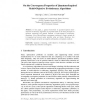127
click to vote
EMO
2005
Springer
15 years 7 months ago
2005
Springer
Abstract. While Single-Objective Evolutionary Algorithms (EAs) parallelization schemes are both well established and easy to implement, this is not the case for Multi-Objective Evo...
81
Voted
VL
2005
IEEE
15 years 7 months ago
2005
IEEE
Evolutionary algorithms (EAs) produce a vast amount of data by recurring processes, e.g., selection, recombination, or mutation, that work on populations of solutions for a speciï...
CIG
2005
IEEE
15 years 8 months ago
2005
IEEE
Abstract- In this paper, we apply an Evolutionary Algorithm (EA) to solve the Rubinstein’s Basic AlternatingOffer Bargaining Problem, and compare our experimental results with it...
123
click to vote
ASAP
2005
IEEE
15 years 8 months ago
2005
IEEE
The task of automatic design space exploration of heterogeneous multi-processor systems is often tackled with Evolutionary Algorithms. In this paper, we propose a novel approach i...
114
click to vote
PPAM
2007
Springer
15 years 8 months ago
2007
Springer
Abstract. Memetic Algorithms are the most frequently used hybrid of Evolutionary Algorithms (EA) for real-world applications. This paper will deal with one of the most important ob...
132
click to vote
ICIC
2007
Springer
15 years 8 months ago
2007
Springer
Abstract. In this paper, a general framework of quantum-inspired multiobjective evolutionary algorithms is proposed based on the basic principles of quantum computing and general s...
226
click to vote
GECCO
2007
Springer
15 years 8 months ago
2007
Springer
A new model for automatic generation of Evolutionary Algorithms (EAs) by evolutionary means is proposed in this paper. The model is based on a simple Genetic Algorithm (GA). Every...
GECCO
2007
Springer
15 years 8 months ago
2007
Springer
There has been a considerable body of work on search–based test data generation for branch coverage. However, hitherto, there has been no work on multi–objective branch covera...
109
click to vote
GECCO
2007
Springer
15 years 8 months ago
2007
Springer
We analyze the performance of evolutionary algorithms on various matroid optimization problems that encompass a vast number of efficiently solvable as well as NP-hard combinatoria...
112
click to vote
GECCO
2007
Springer
15 years 8 months ago
2007
Springer
In this paper, we describe Automated Red Teaming (ART), a concept that uses Evolutionary Algorithm (EA), Parallel Computing and Simulation to complement the manual Red Teaming eff...






